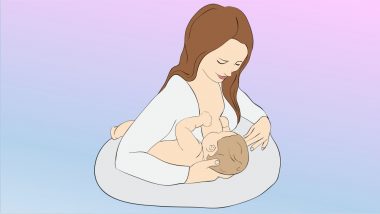Breastfeeding nourishes and nurtures a new-born from birth into early childhood. The benefits to the mother-baby dyad are both immediate and far-reaching. The recommendation is to start nursing the baby from the first hour of birth, breastfeed exclusively for the first six months and continue with complementary solids up to age two. The best beginning for this journey is for mom to make intelligent, educated and informed birth choices. Uninterrupted skin to skin contact in the first sacred hour of birth gives the baby a stress-free transition to a new habitat. Unlimited contact with mom in the first 3 months after birth (“the fourth trimester”) makes for a very relaxed and in-sync dyad.
Breastfeeding is safe, clean, healthy, convenient, always available and cost-effective. It is baby’s first vaccine to good immunity and a healthy life. Breast milk has hundreds of protective elements which change in a tailor-made fashion to meet baby’s needs from day to day, hour to hour, and within the course of the feed itself. This is especially important when the baby is premature and in the NICU. How To Store Breast Milk Correctly.
The very act of sucking, swallowing and breathing at the breast helps better cognitive development, optimal jaw and dental health, speech development, stronger emotional quotient and immunity.
It's Tailor-Made For Your Child
Colostrum, the yellowish, sticky breast milk produced at the end of pregnancy, is recommended by WHO as the perfect food for the new-born, given at the first hour. The milk modifies its nutrients based on what your child needs at each stage of development.
It Increases Emotional Bonding
Breastfeeding promotes lots of skin to skin contact which increases oxytocin levels in mother and baby, promoting close bonding relationship & increased milk supply. Breastfeeding gives milk in the right quantity and temperature, you are more tuned to your baby’s needs. 5 Myths About Breastfeeding We Should Stop Believing In.
It Decreases Risk of Sudden Infant Death Syndrome
Sudden Infant Death Syndrome (SIDS) involves the unexplained death of babies younger than a year. SIDS usually occurs during sleep. Breastfeeding significantly reduces the risk of SIDS by approximately 50% at all ages throughout infancy.
It Decreases Risk of Cancers
Breast milk reduces the risk of cancers in the early years. Breastfeeding as an infant protects diseases like diabetes, celiac disease, Crohn’s disease, respiratory illnesses and many others.
It Promotes Good Health and Immunity
The incidence of colds, ear infections, viral fevers, pneumonia and diarrhoea is significantly less among breastfed babies. Breast milk is the best medicine for pain or sickness. Preterm babies are protected from NEC (Necrotising Enterocolitis) which is a dangerous gut infection.
Researchers behind a 10-year study involving 2,90,000 Chinese women published in the Journal of the American Heart Association in 2017 found that women who breastfeed have a 9 percent lower chance of developing heart disease than women who don't breastfeed. Breastfeeding more than one child for two years or longer, appeared to deliver even greater protective benefits.
Breastfeeding Protects Moms From Cancer
Lactation helps the breast tissue fully mature. It is when it never gets the chance to do so that there’s an increase in risk for abnormal, cancerous growths within those tissues.
It Burns Calories
Your body puts a whole lot of effort into filling up your breasts with nutrient-rich milk, burning more than 500 calories a day in the process. It also improves glucose metabolism and insulin sensitivity, which is to say it helps your body turn food into fuel.
It Reduces Risk of Ovarian Cancer
Breastfeeding controls ovulation, which reduces the risk of ovarian cancer. It also causes higher levels of special antibodies to a protein found in ovarian cancer cells. This means breastfeeding also acts as an immunisation to build up your resistance to diseases.
Reduces Risk of Type 2 Diabetes
Research shows that breastfeeding increases insulin sensitivity and improves glucose metabolism in mothers. This ultimately reduces the risk of developing Type 2 diabetes, particularly among women who develop gestational diabetes during pregnancy.
Reduces Risk of high blood pressure and heart attack
Hormones such as oxytocin and prolactin used to make milk have a secret superpower: They also lower your blood pressure. Breastfeeding affects women’s hormones and body fat in ways that keep the heart healthy, likely by ’resetting’ the body after pregnancy to restore metabolic and cardiac health.
(Dr Aruna Savur - Paediatrician (DNB), Neonatologist (Fellowship in neonatology), Lactation Consultant (IBCLC, BPNI-IYCF, Lactation Consultant (IBCLC,BPNI-IYCF), Member of Medela India LC Club)
(The above story first appeared on LatestLY on Nov 06, 2018 03:01 PM IST. For more news and updates on politics, world, sports, entertainment and lifestyle, log on to our website latestly.com).













 Quickly
Quickly


